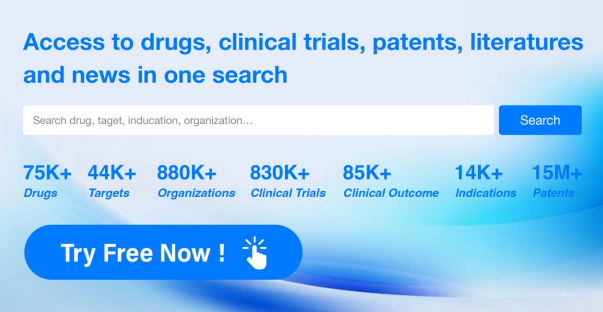Keywords:
tegoprazan, tegoprazan’s R&D Progress, Mechanism of Action for tegoprazan, drug target for tegoprazan.
Description:
This article summarized the latest R&D progress of tegoprazan, the Mechanism of Action for tegoprazan, and the drug target R&D trends for tegoprazan.
Text:
Tegoprazan‘s R&D Progress
Tegoprazan is a small molecule drug that targets H+/K+ ATPase, an enzyme involved in the production of stomach acid. It is primarily used in the treatment of various conditions related to the digestive system, infectious diseases, mouth and tooth diseases, and otorhinolaryngologic diseases.
The active indications for Tegoprazan include esophagitis, peptic esophagitis, gastroesophageal reflux, duodenal ulcer, erosive esophagitis, non-erosive gastro-esophageal reflux disease, Helicobacter pylori infection, Helicobacter Infections, and stomach ulcer. These conditions are often characterized by excessive stomach acid production and can lead to discomfort and complications if left untreated.
Tegoprazan was developed by Pfizer Inc., a renowned pharmaceutical company. It has reached the highest phase of development which is approved globally. The drug was first approved in South Korea in July 2018, marking its initial entry into the market.
The approval of Tegoprazan signifies its safety and efficacy in treating the mentioned conditions. As a small molecule drug, it is designed to specifically target H+/K+ ATPase, inhibiting its activity and reducing the production of stomach acid. By doing so, Tegoprazan helps alleviate symptoms and promote healing in patients suffering from esophagitis, reflux diseases, ulcers, and other related disorders.
The therapeutic areas of Tegoprazan highlight its potential to address a wide range of medical conditions, particularly those affecting the digestive system. Its approval in multiple countries, including China, further emphasizes its global recognition and potential for widespread use.
Please click on the image below to directly access the latest data (R&D Status | Core Patent | Clinical Trial | Approval status in Global countries) of this drug.
Mechanism of Action for tegoprazan: H+/K+ ATPase blockers
H+/K+ ATPase blockers are a type of medication that inhibit the activity of the H+/K+ ATPase enzyme. This enzyme is responsible for the secretion of gastric acid in the stomach. By blocking the H+/K+ ATPase enzyme, these medications reduce the production of stomach acid, which can be beneficial in the treatment of conditions such as gastroesophageal reflux disease (GERD), peptic ulcers, and Zollinger-Ellison syndrome.
From a biomedical perspective, H+/K+ ATPase blockers work by binding to the H+/K+ ATPase enzyme and preventing it from pumping hydrogen ions into the stomach, thereby reducing the acidity of gastric acid. This mechanism of action helps to alleviate symptoms associated with excessive stomach acid production and promote the healing of ulcers.
Examples of H+/K+ ATPase blockers include proton pump inhibitors (PPIs) such as omeprazole, esomeprazole, lansoprazole, pantoprazole, and rabeprazole. These medications are commonly prescribed for the management of acid-related gastrointestinal disorders.
Drug Target R&D Trends for tegoprazan
The H+/K+ ATPase, also known as the proton pump, plays a crucial role in the human body by regulating the production of stomach acid. Located in the parietal cells of the stomach lining, this enzyme is responsible for the secretion of hydrogen ions into the stomach, which combine with chloride ions to form hydrochloric acid. This acid is essential for the digestion of food, as it helps break down proteins and activates digestive enzymes. However, overactivity of the H+/K+ ATPase can lead to conditions like gastroesophageal reflux disease (GERD) and peptic ulcers, necessitating the use of proton pump inhibitors (PPIs) to inhibit its function and reduce acid production.
According to Patsnap Synapse, as of 7 Sep 2023, there are a total of 19 H+/K+ ATPase drugs worldwide, from 27 organizations, covering 21 indications, and conducting 175 clinical trials.
The analysis of the target H+/K+ ATPase reveals that Takeda Pharmaceutical Co., Ltd. is the leading company in terms of R&D progress, with multiple drugs in different stages of development. The approved drugs under this target are primarily indicated for stomach ulcers, duodenal ulcers, Helicobacter pylori infection, gastritis, and other related indications. Small molecule drugs are the most rapidly progressing drug type, indicating intense competition in the market. Japan, the United States, and South Korea are the countries developing fastest under this target, with China also making progress. The competitive landscape for the target H+/K+ ATPase is dynamic, with multiple companies and countries actively involved in research and development. Future development in this area is expected to focus on expanding indications and developing innovative drug types to address unmet medical needs.
Please click on the picture link below for free registration or log in directly if you have a freemium account, you can browse the latest research progress on drugs, indications, organizations, clinical trials, clinical results, and drug patents related to this target
Conclusion
In summary, Tegoprazan is a small molecule drug developed by Pfizer Inc. that targets H+/K+ ATPase. It has been approved for use in treating various conditions related to the digestive system, infectious diseases, mouth and tooth diseases, and otorhinolaryngologic diseases. Its approval in South Korea in 2018 marked its initial entry into the market, and it has since gained approval in other countries, including China. Tegoprazan’s success in clinical trials and its specific mechanism of action make it a promising option for patients suffering from esophagitis, reflux diseases, ulcers, and related disorders.



